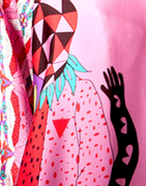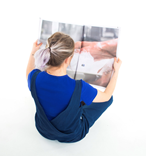This programme is taught at the GSA's campus in the Highlands of Scotland. More information on living and studying at our Highlands campus is available here.
The circular economy has become synonymous with a more sustainable and equitable society. One that eliminates waste while creating social, economic, and ecological value. Achieving circularity requires working collaboratively and recognising the roles governments, industry and citizens can play in a more environmentally conscious future. This course focuses on the exploration of the key schools of thought for a circular economy, how they are applied today, and how they could be applied in a future society. It enables you to combine circular economy theories and approaches into contemporary design innovation practice, as a method of developing more environmental and socially conscious designs. It aims to foster a re-thinking of our current economy to one that values environmental, social, and economic sustainability, and a fairer more just society.
Aim of the programme
This programme focusses on the key ecological and social design aspects of the circular economy. Enabling students to combine circular economy theories and methods into contemporary design innovation practice, as a method of developing environmental and socially conscious design. This course seeks to equip students with the skills and knowledge to apply innovation in practical ways to develop more socially and ecologically conscious circular services, systems, businesses, and communities. The course aims to develop students thinking beyond the human so they can innovate eco centred solutions to contemporary global challenges. This programme aims to:
- Extend your knowledge of the key schools of thought surrounding the circular economy
- Develop a critical understanding of the theory and practice of design innovation as an approach to contemporary design problems and issues;
- Develop your ability to contribute to the contemporary debates in the context of the Circular Economy;
- Equip you to engage in collaborative, cross discipline working, with a variety of stakeholders;
- Extend your skills to conceive, manage, and deliver a collaborative design project in the context of the Circular Economy;
Content
The MDes in Design Innovation & Circular Economy focuses on the social value of circular economy design, as well as its economic importance. It is about addressing real problems that affect real people, by understanding them from each stakeholder’s point of view. It has an international perspective, and a local focus, utilising and developing the rich natural and economic resource of the Scottish Highlands and the broader geographical area around our Highlands campus, where this programme is based. In addition, our Highlands campus has a permaculture garden, and is also currently host to specialisms in environmental design, interaction design, and future heritage, each of which offers opportunities for interdisciplinary learning and practice.
In this programme, through a blend of lectures delivered by staff and guest specialists, tutorials, and studio-based projects, you will learn the value of collaborative and interdisciplinary ways of working alongside a contemporary design innovation practice. You will explore the various schools of thought associated with the circular economy while developing practical design innovation research and practice methods. The course emphasises problem setting and deep understanding of context as a method of developing circular solutions to contemporary societal issues.
Structure
This is a studio-based programme where you will have the opportunity to work collaboratively and independently on project briefs, allowing you to apply your learning about the circular economy and innovation to your own practice and develop your own areas of interest. Through lectures and tutorials you will learn about circular economy key schools of thought and be guided through two studio based projects where learning will be put into practice.
You will also engage with peers from international schools as part of the annual Winter School. This seasonal event brings together students and faculty from leading institutions around the world for a programme of lectures, workshops and networking opportunities that offers an insight into what a career in design as a global activity looks like.











